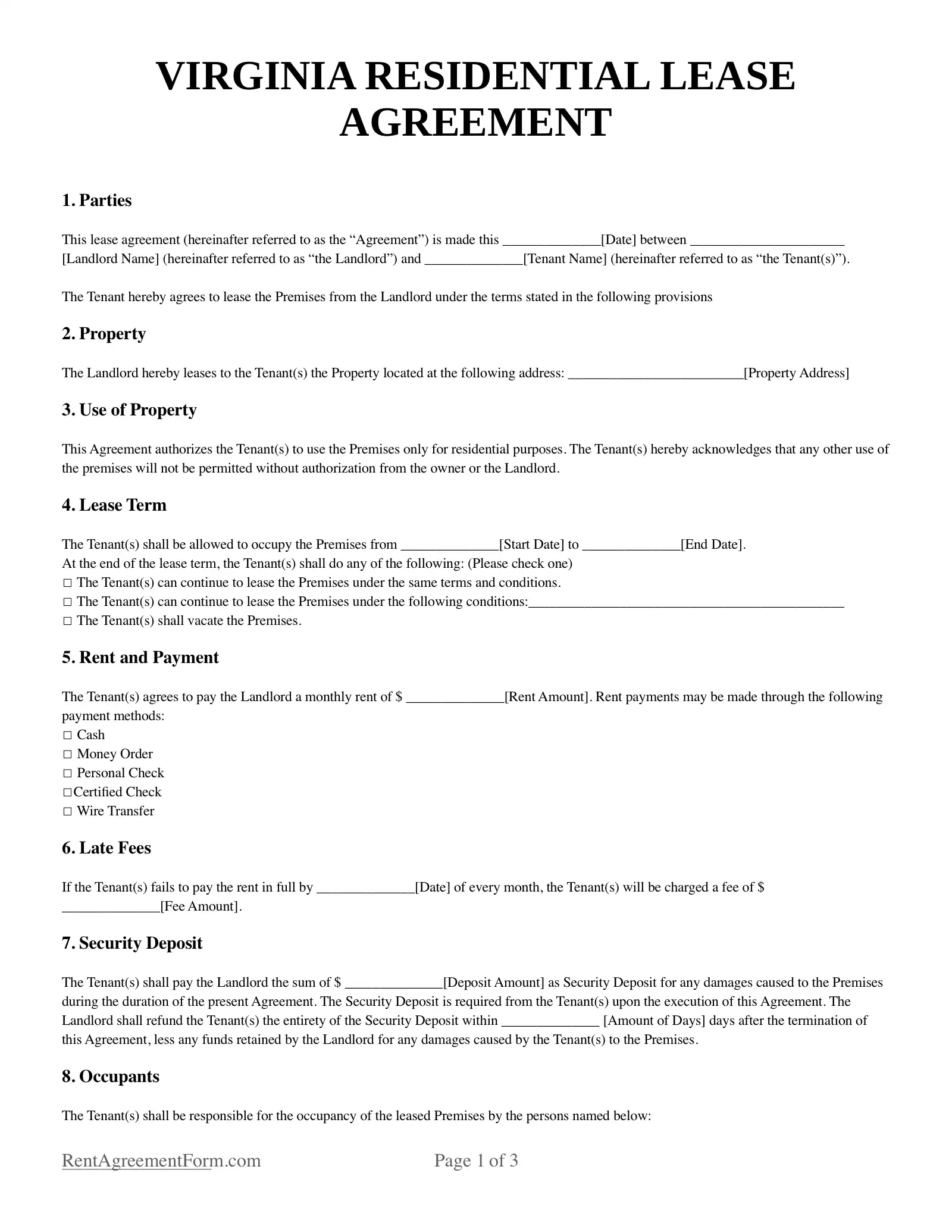Virginia Residential Lease Agreement Form
A Virginia Residential Lease Agreement Form is a fillable contract between a landlord and tenant regarding the temporary use of a property. The agreement indicates all the specifics of the tenancy, such as length of stay and monthly rent.
The lease agreement also outlines the responsibilities of both the landlord and tenant. The tenant is obliged to pay rent on time, while the landlord must ensure that the property is safe and secure for occupancy at all times. The tenant should not recklessly damage the rental property, while the landlord is responsible for repairs when issues arise.
A printable Virginia rental agreement template is available for download for maximum convenience. It can be signed as-is or changed to include everything the landlord and tenant agreed on. It must also include all rental property disclosures mandated by Virginia law.

Required Disclosures in Virginia Residential Lease Agreement
When drafting a rental agreement, Virginia law requires landlords to provide the following disclosures:
- Lead-Based Paint - In 1978, the US government passed a federal law banning lead-based paint. In relation to this, Virginia landlords must disclose if the property being leased out was built before that year. The landlord must also provide the tenant with pamphlets about the health hazards of lead (Lead-Based Paint Disclosure Rule (Section 1018 of Title X)).
- Defective Drywall - If the property has defective drywall, the landlord must inform the tenant about it. The disclosure should happen before the lease agreement is signed (Code of Virginia § 55.1-1218).
- Methamphetamines - The tenant has the right to know if the property was used to manufacture methamphetamines and was not cleaned according to legal guidelines (Code of Virginia § 55.1-708).
- Military Air Zone - The landlord must inform the tenant if the property is near an airbase. This is because the area is an accident zone, and there is potential for noise pollution. The landlord can check local zoning maps to determine if the disclosure is necessary (Code of Virginia § 55.1-1217).
- Mold and Other Damage - The Code of Virginia requires landlords to accomplish a move-in inspection report within five days of occupancy. If the property has a mold problem, it should be noted in the checklist. Other damaged areas should also be included in the report (Code of Virginia § 55.1-1215).
- Displacement - The tenant has the right to know if there’s a possibility that they will be displaced through the sale of the property, a planned demolition, or conversion of rental property to commercial or office spaces (Code of Virginia § 55.1-1216).
Virginia Rent Grace Period
There is a mandated five-day rent grace period in Virginia. If, after five days, the tenant still has not paid rent, then the landlord can charge a late fee.
The late fee cannot be more than 10% of the monthly rent or 10% of the balance of the rent owed.
Security Deposit Laws in Virginia
A security deposit is a good cushion if the tenant fails to pay rent or leaves behind damage to the property when they move out.
No Virginia law requires landlords to collect security deposits. But if a landlord chooses to collect a security deposit, they cannot set an amount higher than two months’ worth of rent.
When the tenancy ends, the landlord has 45 days from the day the tenant moves out to return the security deposit (Code of Virginia § 55.1-1226).